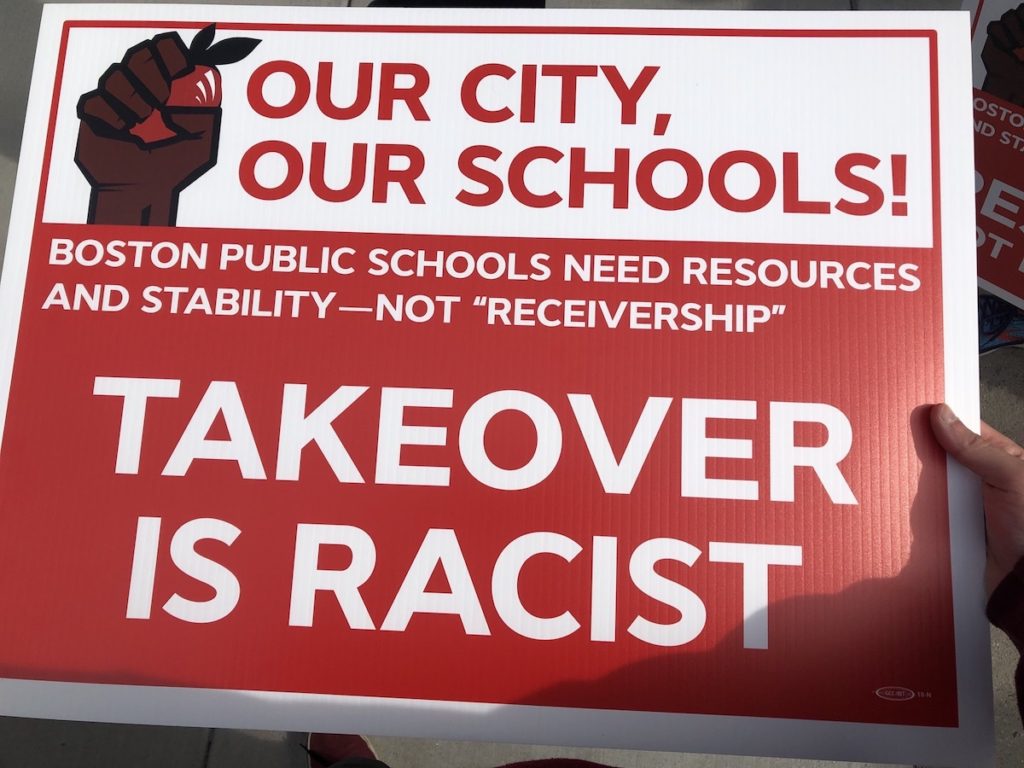On May 24, 150 members of the Boston Teachers Union and their allies rallied outside the Massachusetts Statehouse. Inside, the Board of Elementary and Secondary Education met to discuss a possible takeover of the Boston Public Schools district by the Massachusetts Department of Elementary and Secondary Education — a process known as “state receivership.”
Receivership means that the Department of Elementary and Secondary Education would replace the superintendent, overriding the authority of Boston Mayor Michelle Wu and the school committee. Up to 100% of a school’s teaching staff could be replaced with less experienced, less diverse and lower paid teachers. The state would also be empowered to unilaterally “limit, suspend, or change” any provision in the BTU’s contract, a serious threat to the union’s power to collectively bargain.

According to the Achievement Gap Act of 2010, the Department of Elementary and Secondary Education has the power to take over schools or entire districts that the state deems “chronically underperforming.”
The DESE released a report on May 23 highlighting issues BPS has had for years: lack of teacher diversity, segregation of students of color with disabilities, unkempt and old infrastructure and more. The Board poses receivership as the solution to this situation.
The Boston Teachers Union has been fighting for a new contract since their current contract expired in August 2021, months before receivership was proposed. The teachers’ demands include funding to address the exact issues named in the DESE report. But instead of listening to the union and settling a fair contract, the state is considering takeover.
The crisis in Boston Public Schools
In 2019, DESE Commissioner Jeffrey C. Riley carried out an audit of Boston Public Schools which found 34 out of 125 schools in the lowest 10% of state rankings. Schools in the lowest-income communities in Massachusetts generally rank in the lowest 10%. Seventy-one percent of students in BPS are considered “low income” and the district has a disproportionate percentage of English language learners and students with disabilities.
When the May 23 report was released, Riley described the situation in BPS as “urgent.”
The Board of Elementary and Secondary Education also threatened state receivership in 2020, but the dispute ended when BPS, the BTU and BESE signed a Memorandum of Understanding to address the same issues named in the May 23 report. The BESE and others have since complained that Boston Public Schools have failed to make “progress” on those issues.
Cecil Carey, a teacher at Charlestown High School, told Liberation News, “It is ridiculous that the state is ridiculing us for not making so-called ‘progress’ in the middle of a pandemic that is NOT over and disproportionately affects the communities we serve. We’ve dealt with historic staff shortages, increased mental health challenges for both students and staff, all on top of a situation that was broken and underfunded before the pandemic! What schools need is support and resources, not reprimands and undemocratic takeovers.”
Privatization and the disastrous record of receivership
State receivership in other Massachusetts districts such as Lawrence, Southbridge and Holyoke have failed to address the problems of those districts, and have even exacerbated them. Under state control, all three districts have yet to move out of the lowest 10% in the ranking system. BPS is also currently outperforming all three based on DESE’s own metrics.
“What schools need is support and resources, not reprimands and undemocratic takeovers.”
Cecil Carey, Charlestown High School Teacher
In Lawrence, Massachusetts, a district where 88% of students are classified as low-income and 71% are classified as English language learners, just 21% of students scored “meeting expectations” or higher on the MCAS math exam in 2021 — despite being more than 10 years under DESE receivership.
In Springfield, Mass., the state led the creation of the “Springfield Empowerment Zone Partnership,” which is a cohort of 17 schools. According to an analysis of SEZP schools performance ratings in 2019, seven out of nine were found to be in the lowest 5%.
A compromise between BESE and BPS would create the same ineffective empowerment zones as in Springfield.
As a 2018 Massachusetts Teachers Association report “Threat from the Right Intensifies” warned: “Charter supporters are backing public school restructuring that is creating charter-like models for schools through ’empowerment’ zones — actually takeover zones — and other governance changes.”
Teachers Union leads the fight for a better BPS
Over the past months, the BTU has been leading a multi-pronged fight for a fair contract and against state takeover. BTU’s current contract proposals include modernizing school buildings, hiring a diverse educator workforce, and full funding for special education and English language learning programs. The proposals include other “common good demands” — supports for students including affordable housing, and resources teachers need like fair pay and funding for all curriculum.
Since Board of Elementary and Secondary Education member Matt Hills proposed state receivership earlier this year, the BTU has been taking the streets in protest. The union created the Our City, Our Schools coalition, and organized supporters to call Governor Charlie Baker and sign letters of support against the takeover.
The vote on receivership will take place June 24. The BTU has announced that there will be more rallies and actions for supporters to take in the coming month as the struggle heats up.
Follow the Boston Teacher’s Union on Instagram, Facebook, or Twitter to stay up to date on the struggle against receivership.




